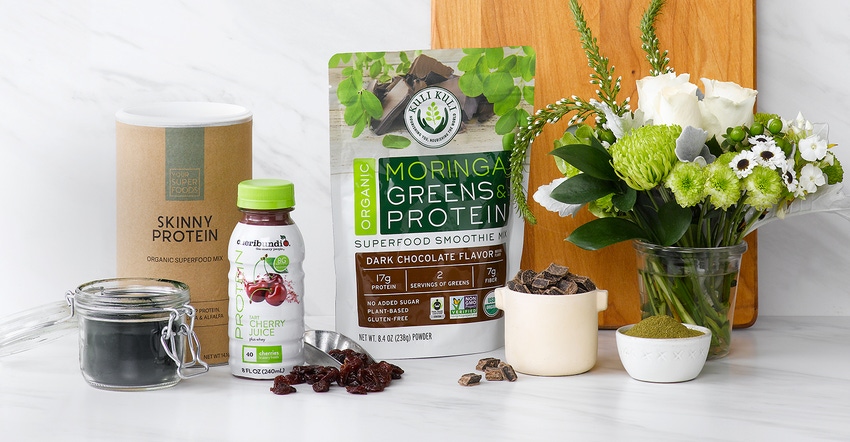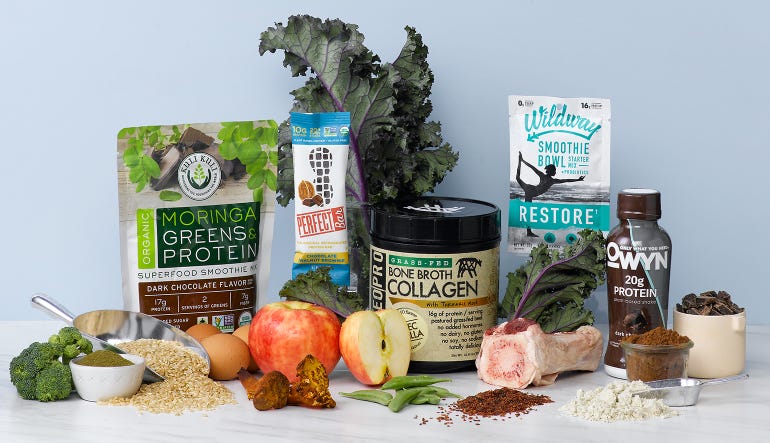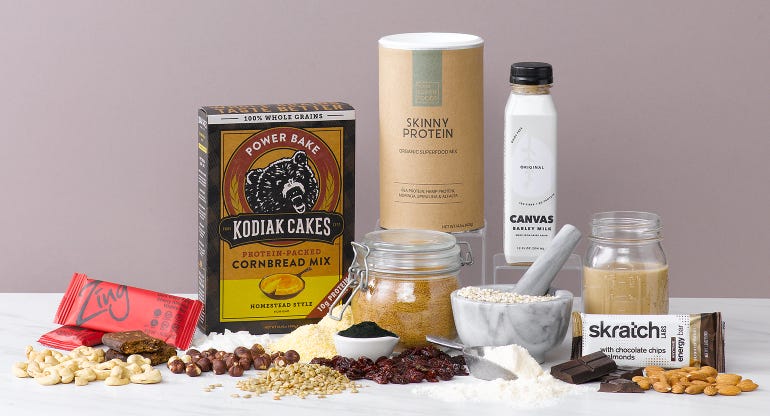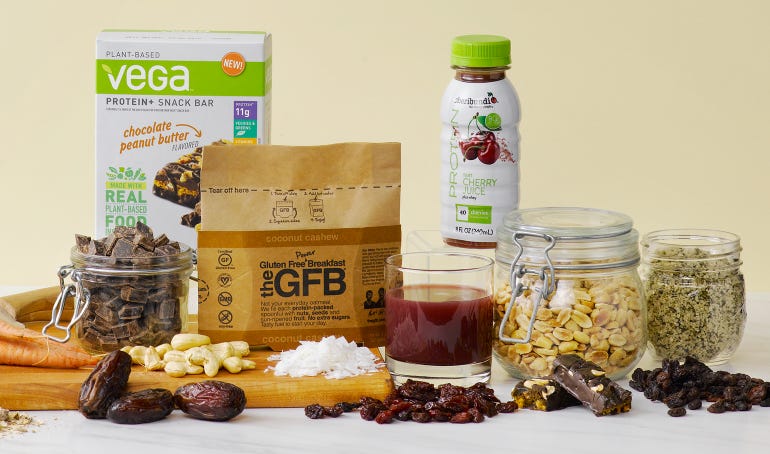
Old-school protein-packed products, once found solely on dusty gym store shelves and emblazoned with images of very fit people, bear little resemblance to the emerging class of protein-focused foods and beverages. Sure, body builders may have sparked the protein-fitness connection. But the recent influx of cleaner, nutrient-pumped protein products shatters the trope that protein is just for ripped dudes. Rather, the rising class of protein-packed products are designed to appeal to all consumers.
Meanwhile, shoppers are getting smarter about their protein sources, both in terms of sourcing and quantity. Whey is more often than not derived from grass-fed cows. Plant-based options are blended from pea, rice, non-GMO or organic soy, and sometimes from innovative proteins such as pumpkin powder and spent barley grain from craft breweries.
Indeed, it seems everyone wants to up protein intake. According to 2017 research conducted by the Hartman Group, 60 percent of Americans from all demographics are actively trying to increase protein intake. “Along with fiber and healthy fats, consumers look to protein and its associated nutrient density to help them feel full—with a sense of sustained energy—throughout the day,” according to the report.
Such zeal for protein is reflected at checkout. Products are garnering sales velocity in nearly every category in the grocery store. According SPINS, in the year ending Sept. 10, 2017, sales of protein-filled foods and beverages across all channels topped $3.5 billion, up $124 million from the previous year. At $1.2 billion, the wellness bars and gels group is one of the largest protein categories. Over the same time period, sales of protein-containing shelf-stable baking mixes, ingredients and flours experienced more than double growth to $20 million. In the natural channel, frozen desserts also experienced strong growth in the 52 weeks ending Sept. 10, 2017, with sales rising 45 percent to $6.7 million.
The protein paradox is that most Americans reach their Daily Recommended Value of protein. So how are brands stoking consumer excitement? In addition to prioritizing novel protein sources, manufacturers are upping the nutrient density by incorporating trendy add-ins. We’re talking smoothie mixes with adaptogens such as ashwagandha and moringa, and chocolate nutrition bars that contain vitamin C-rich acerola cherry extract and even carrot and tomato (really!).
It’s rare to see bars, snacks or beverages that contain more than 30 to 40 grams of protein in one serving anymore, as shoppers are using protein products to boost satiety and energy and squelch hunger, not necessarily to boost muscle. Focusing on nutrition, taste and experience helps sets protein brands apart.
Brands can spend years perfecting protein formulations to achieve a palatable product. For example, Jeff Mroz, co-founder of OWYN (Only What You Need), a protein-based beverage and smoothie powder company, spent four years developing his new RTD product.
“We surveyed thousands of consumers and found that greens were among the top ingredients people wanted in their diet, but found it very hard to incorporate,” he said. A former pro athlete, Mroz adds that at 20 grams, OWYN is either a pre- or post-workout snack, or a simple, energizing light meal.
It is not just protein-based beverages that are culling favor with consumers. Protein bars? Protein pancakes? Protein desserts? Consumers will give a resounding “Yes!” to all—if they have a little something extra in them, too.

Kuli Kuli Moringa Greens & Protein Superfood Smoothie Mix
In line with the trend of boosting protein blends with superfood greens, Kuli Kuli mixes organic, sustainably grown moringa leaf—a green with more protein, calcium, iron and fiber than kale—with organic pea protein and rice protein, Fair Trade Certified cocoa, organic stevia for sweetness and a touch of salt. One-third cup of the powder adds 17 grams protein and 20 percent of the Recommended Daily Value of iron to a smoothie. Kudos Kuli Kuli for making herbaceous, grassy moringa more palatable for U.S. consumers. SRP: $29.99
Perfect Bar Chocolate Walnut Brownie
Launching in February, Perfect Bar expands its wildly successful line of refrigerated nutrition bars with this USDA Organic peanut butter, hemp protein, rice protein and chia powder bar. Reminiscent of a chunky, nut-filled brownie, Perfect Bar stands out for the inclusion of dried whole-food powders including kale, rose hip, orange, lemon, papaya, tomato, apple, alfalfa, celery, kelp, carrot and more. Ten grams of protein and 280 calories will fill customers up without weighing them down. Also keep an eye out for the new Mocha Chip flavor. SRP: $2.99
PaleoPro Grass-Fed Bone Broth Collagen with Turmeric Root
A protein powder formulated and branded for followers of the paleo diet, this vanilla-flavored, monk fruit-sweetened powder features pasture-raised grass-fed beef collagen for a total 16 grams protein per 18-gram scoop, and turmeric root powder to support a healthy inflammation response. Also available in single-serve, take-along packets, the California-based company PaleoPro makes it easy for the CrossFit set (or those with chronic digestion issues who eschew dairy, sugar, soy and gluten) to consume more clean protein conveniently. SRP: $39.99
Wildway Smoothie Bowl Starter Mix Restore
New from the grain-free experts at Wildway, this smoothie bowl starter blend is a paleo-friendly mixture of egg whites, MCT oil powder, coconut flour, hydrolyzed collagen, flaxseeds, probiotics and an adaptogenic blend of maca root, ashwagandha and reishi mushroom. Unlike most protein powder brands, Wildway adds no sugar or flavor to its four-SKU line of functional smoothie starters (which also include Recover, Relax and Recharge) as the company believes customers should add sweetener to their liking, or none at all, directly in the blender. Each single-serve packet contains 16 grams protein. SRP: $3.99
OWYN Dark Chocolate
This 12-ounce, chocolate-flavored beverage features 20 grams protein derived from a unique blend of pea protein, organic flaxseed oil and organic pumpkin powder. Free from soy, dairy, gluten, stevia or gut-irritating sugar alcohols, OWYN’s silky texture and relatively low sugar content (just 4 grams for the entire bottle!) makes this 180-calorie product a welcome addition to the protein beverage category. OWYN wins bonus points for its inclusion of an organic greens blend of kale, spinach and broccoli—we promise, you can’t taste it—and 535 mg of omega-3s. SRP: $2.99

Zing Dark Chocolate Cherry Almond Vitality Bar
A decadent-tasting, 210-calorie nutrition bar made with a delicious blend of almonds, rice protein concentrate, sunflower seeds and organic brown rice crisps. Prebiotic tapioca fiber supports healthy levels of good bacteria colonies in digestive systems (prebiotics are what probiotics eat), and elevates this bar’s fiber content to 8 grams per serving. Ingredients like organic tapioca syrup, dark chocolate, dried cherries, unsweetened coconut and hazelnuts lend the bar a dessert-y feel and taste. Yum! SRP: $2.00
Kodiak Cakes Power Bake Cornbread Mix
Picture fragrant, golden cornbread, steaming and piping hot from the oven in a cast iron pan, the edges crispy with fried butter. This is the cornbread of our dreams, and Kodiak Cakes makes it healthier with this protein-packed cornbread mix. Made with whole grain wheat flour, whole grain corn meal, cane sugar and a blend of wheat, whey and milk proteins, each 140-calorie serving of prepared cornbread contains 10 grams protein, making it a near perfect wintry breakfast, après snack or appetizer. SRP: $4.99
Your Superfoods Skinny Protein
This popular Berlin-based protein brand—packaged in an attractive container customers will actually want to display on the kitchen counter—is making its debut in the United States. A supersimple formulation containing just USDA Organic hemp and pea proteins, moringa, spirulina and alfalfa powder, this verdant smoothie add-in contains a reasonable 9 grams protein for just 2 tablespoons. It boosts the beverage without overpowering the smoothie. Your Superfoods also partners with Action Against Hunger, an organization that distributes lifesaving emergency food packets around the world. SRP: $36.90
Canvas Barley Milk Original
Touted as the first milk ever made from reused grain, this newly launched brand could represent the future of sustainable food. Canvas partners with craft breweries to salvage spent grain (grain leftover from the beer making process) and mixes it with cashew milk, coconut milk, coconut sugar, pea protein isolate and chicory root extract for added fiber. The result is a beverage that contains 8 grams of protein, 230 calories, ample MCTs for optimal brain health and good conscience knowing the product reduces food waste. SRP: $4.99
Skratch Labs Anytime Energy Bar with Chocolate Chips & Almonds
New from the makers of the ultra-popular hydration powdered beverage comes this energy bar designed to fuel workouts. It blends nourishing cashew butter and tahini, oats, tapioca syrup and coconut nectar for sweetness, and a crispy blend of brown rice crisps, quinoa crisps, oat flour and sorghum flakes for crunch and added fiber. This bar contains relatively low protein—4 grams, which is perfect for a snack or mini meal. Also available in a savory miso and ginger flavor. SRP: $2.65

Vega Protein+ Snack Bar Chocolate Peanut Butter
It’s only 200 calories, but in a pinch this new chocolate-peanut butter bar from the plant-based experts at Vega could pass for lunch. Each bar contains 11 grams protein from a blend of pea protein and brown rice protein, rounded out with hemp seeds and chia seeds and both peanut butter and whole peanuts for added crunch. What’s most exciting, however, is Vega’s inclusion of a dried fruit and vegetable blend that contains a whopping 10 superfoods such as carrot, beet, tomato and cranberry, and B vitamins—important nutrients for vegans as there aren’t many plant-based sources. SRP: $1.99
The GFB Power Breakfast Coconut Cashew
Novel new packaging from The Gluten Free Bar (GFB) lies flat, eliminates the need for a bowl and is mostly recyclable, unlike some just-add-water oatmeal cups (which are coated with a leak-proof lining). This wholesome breakfast blend features certified gluten-free oats, chopped dates, toasted cashews and coconut, raisins, raw hemp hearts, toasted sunflower seeds and more. This combo elevates the protein content to a satisfying 7 grams per serving—all from whole, nutritious sources. SRP: $2.49
Cheribundi Protein Tart Cherry Juice Plus Whey
Research shows that sipping tart cherry juice can help athletes recover from intense workouts faster and help them sleep better. So it’s fitting that Cheribundi, a brand that specializes in tart cherry beverage products, would launch a protein-boosted option specifically designed for fitness recovery. Each 8-ounce bottle features never-from-concentrate tart cherry juice (which contains 160 cherries) and 8 grams of whey protein. A touch of stevia and vanilla extract round out the juicy flavor of this throw-it-in-your-gym-bag beverage. SRP: $2.25
About the Author(s)
You May Also Like
.png?width=700&auto=webp&quality=80&disable=upscale)




